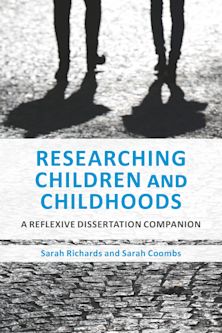- Home
- ACADEMIC
- Research Methods
- Research Skills
- Getting the Holy Ghost
Getting the Holy Ghost
Urban Ethnography in a Brooklyn Pentecostal Tongue-Speaking Church
Getting the Holy Ghost
Urban Ethnography in a Brooklyn Pentecostal Tongue-Speaking Church
You must sign in to add this item to your wishlist. Please sign in or create an account
Description
This book carries an ethnographic signature in approach and style, and is an examination of a small Brooklyn, New York, African-American, Pentecostal church congregation and is based on ethnographic notes taken over the course of four years. The Pentecostal Church is known to outsiders almost exclusively for its members’ “bizarre” habit of speaking in tongues. This ethnography, however, puts those outsiders inside the church pews, as it paints a portrait of piety, compassion, caring, love—all embraced through an embodiment perspective, as the church’s members experience these forces in the most personal ways through religious conversion. Central themes include concerns with the notion of “spectacle” because of the grand bodily display that is highlighted by spiritual struggle, social aspiration, punishment and spontaneous explosions of a variety of emotions in the public sphere. The approach to sociology throughout this work incorporates the striking dialectic of history and biography to penetrate and interact with religiously inspired residents of the inner-city in a quest to make sense both empirically and theoretically of this rapidly changing, surprising and highly contradictory late-modern church scene.
The focus on the individual process of becoming Pentecostal provides a road map into the church and canvasses an intimate view into the lives of its members, capturing their stories as they proceed in their Pentecostal careers. This book challenges important sociological concepts like crisis to explain religious seekership and conversion, while developing new concepts such as “God Hunting” and “Holy Ghost Capital” to explain the process through which individuals become tongue-speaking Pentecostals. Church members acquire “Holy Ghost Capital” and construct a Pentecostal identity through a relationship narrative to establish personal status and power through conflicting tongue-speaking ideas. Finally, this book examines the futures of the small and large, institutionally affiliated Pentecostal Church and argues that the small Pentecostal Church is better able to resist modern rationalizing forces, retaining the charisma that sparked the initial religious movement. The power of charisma in the small church has far-reaching consequences and implications for the future of Pentecostalism and its followers.
Table of Contents
Part 1
Chapter 1: A Brief Overview of Global Pentecostalism
Chapter 2: Brownsville, Brooklyn
Chapter 3: Holy Ghost Church Organizational Structure
Part 2
Chapter 4: The Main Characters
Chapter 5: The Pentecostal Scene and its Music
Chapter 6: Becoming a God Hunter
Chapter 7: Getting Saved
Chapter 8: Speaking in Tongues
Part 3
Chapter 9: The Future of the Black Tongue Speaking Church
Chapter 10: Individual Consequences to Becoming a Pentecostal
Product details
| Published | Jan 30 2013 |
|---|---|
| Format | Ebook (PDF) |
| Edition | 1st |
| Extent | 322 |
| ISBN | 9798216223993 |
| Imprint | Lexington Books |
| Publisher | Bloomsbury Publishing |
About the contributors
Reviews
-
This four-year ethnographic study of a small African American church in Brooklyn, a revision of the author's PhD dissertation, is exceptionally well organized. Sociologist Marina highlights what he sees as "exotic" aspects of Pentecostal worship, and is most interested in the processes of religious conversion, which he relates to speaking in tongues. He uncovered tremendous diversity of opinion within church members' thoughts concerning glossolalia. Earlier researchers examined glossolalia as a form of altered states of consciousness, but Marina offers mainly sociological explanations and ultimately argues that church members understand tongue speaking primarily as a form of social empowerment. He also insightfully analyzes church organization, outlining the formal and informal structures of the Holy Ghost Church with attention to charismatic authority. Earlier studies of Pentecostalism predicted that church authority would become increasingly bureaucratic over time, but Marina convincingly argues that leaders in smaller Pentecostal congregations are better able to maintain their claims to charisma. The author's presentation is clear, his attention to ethnographic detail exemplary, and his scholarship sound. A significant contribution to the study of African American Pentecostalism. Summing Up: Highly recommended. All levels/libraries.
Choice Reviews
-
Getting the Holy Ghost makes significant contributions to our understanding of African-American Pentecostalism and to the sociological study of religious conversion. The author successfully highlights some of the tensions between traditional religion and the complexities of urban life . . . . [Getting the Holy Ghost] is an excellent study. Marina’s presentation is clear, his attention to ethnographic detail is exemplary, and his scholarship is thorough. Highly recommended.
PentecoStudies
-
Marina’s dramatic narrative style mixed with sociological analysis is . . . enticing. . . .The results remain invaluable for a better understanding of the internal processes operative within individuals and congregations and the impact of the local on the global future of Pentecostalism.
Religious Studies Review
-
[This book] provides a viable and authentic voice to the Holy Ghost Church congregation of working class African-American and African Caribbean in the Brownsville neighborhood of Brooklyn. . . .In essence, Marina provides a[n] . . . objective, well-cited ethnography of a semi-autonomous Pentecostal church. His confession about being a non-religious, non-African Cuban-American, learned of the church through a colleague who belonged, leans credence to his search for objectivity . . . Scholars in the humanities will find this work a useful model to make inquiry of the shifting urban landscape . . . Scholars in theology and religious studies will benefit. . . .It is imperative that Pentecostal scholars and students critically examine the institutional church.
Pneuma: The Journal Of The Society For Pentacostal Studies
-
Through a detailed and densely written observation of a small, non-denominational African/Caribbean Pentecostal church in Brooklyn, New York, Peter Marina. . . .aims to provide a thick and rich description of this church’s practices and beliefs, while it makes key theoretical interventions in the field of sociology of religion. . . .One of the strengths of the book lies particularly in these thick and detailed descriptions resulting from close participant observations that give us lively glimpses into ineffable events. . . .Marina succeeds in providing us with an intimate and in-depth look into this one particular Brooklyn Afro/Caribbean Pentecostal church. . . .The book is a valuable contribution to scholarship across a number of subfields. . . .The author is to be applauded for deftly weaving together a compelling story about this charismatic church through insightful personal observation with sophisticated theoretical interventions.
Contemporary Sociology
-
Peter Marina presents a rare portrait of religious rites in a small community church in Brooklyn, New York. Marina’s skillful use of qualitative data based on first hand accounts, in-depth interviews and daily encounters with neighborhood residents tell an intriguing story involving 'speaking in tongues,' rites of aggregation, and a moving pathos that is part of the historical circumstance of African-American life since slavery. It is powerful ethnography where outsiders are allowed into an often hidden world in plain sight. It is a fascinating account, thoughtful, and dynamic that deserves wide praise and should be read by all interested in life in the city.
Terry Williams, The New School for Social Research
































